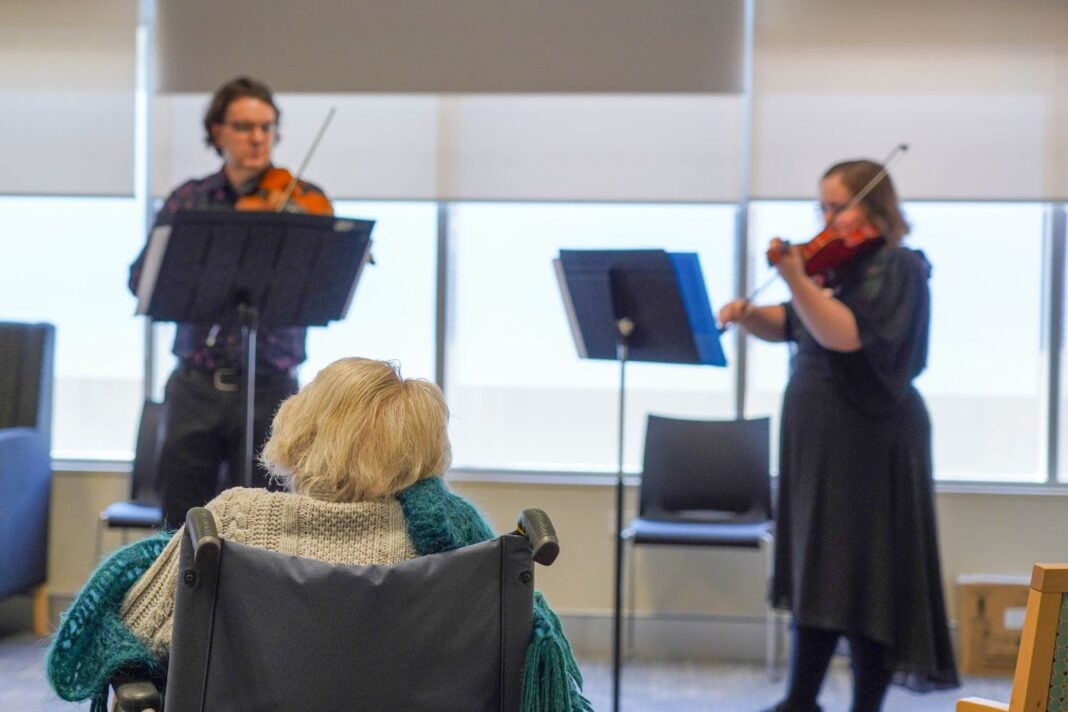Musicians from the Canberra Symphony Orchestra (CSO) are performing bi-weekly concerts for 10 residents of a local aged care home as part of a pilot program seeking to enrich the lives of those with dementia.
Developed by CSO bassoonist and audiologist Kristen Sutcliffe with third-year UC psychology student Heather Roche, Music and Memory has been designed to touch the hearts and minds of people living with dementia, through specifically chosen music.
“We know that the area of the brain responsible for musical memories is one of the last areas of the brain to deteriorate with dementia,” Ms Sutcliffe told Canberra Daily.
“With a piece of music from young adulthood they show responses where they show responses to nothing else; that’s a really powerful thing.”
Currently three weeks into the eight-week pilot program, Ms Sutcliffe said the 10 participants in the program have loved the 30-minute concerts at Goodwin House Ainslie.
The repertoire has been compiled from the results of a questionnaire the participants completed prior to the program’s commencement.
The song list retains a few fixed elements and a few variables, with the repetition of a few crowd favourites at every concert deemed good for the subjects.
With music across all genres from musical theatre to pop, rock and classical, the selection sounds like a lot of fun.
Every concert begins with You are my Sunshine by Jimmy Davis.
“As soon as we start playing it you see the feet tapping, it’s beautiful,” Ms Sutcliffe said.
And each performance is capped off with Almost Like Being in Love from the 1940s musical, Brigadoon.
Then in the middle of every gig there’s even a bit of ABBA and a rendition of Hit the Road Jack.
“From there we’re leaving it to the musicians to play from the list we got from the questionnaire, so we have a bit of variety but not too much,” Ms Sutcliffe said.
“The repetition, I knew from the theoretical side it made sense, but I was a bit anxious it would be boring … it hasn’t been at all.”
Ms Sutcliffe said in her role as emcee for the CSO Music and Memory concerts she has observed plenty of signs of audience enjoyment and participation.
“People will start singing, which is fantastic, I don’t care if people get up and dance,” she smiled. “It has helped people feel settled, stable and calm.”
The idea behind the pilot program is to track and observe any kind of positive behavioural changes in the cohort over that time.
This is quantified by a questionnaire administered by carers before the program started, then again halfway through at the end of week four, and finally at the end of program, week eight.
While there is a body of research showing a strong link between mood and music for those with dementia, Ms Sutcliffe said they’re “aiming to fill a little niche within what’s been done so far” with this program.
“There are a lot of the studies and some fantastic work out there, a lot of it has been looking at individual listening programs through devices,” she said.
“There are some boundaries there potentially with the technology; we wanted to use a live delivery method.”
Ms Sutcliffe also pointed out most of the existing research only utilises generalised music for relaxation, as opposed to their approach with specifically targeted music.
“We’re filling in that niche of having a personalised musical program we can deliver within a live music setting,” she said.
“It affects different people in different ways … but you can’t have any vested interests, we’ll have to wait and see what happens.”
Having also championed and administered the CSO’s Residscovering Music program for people with hearing loss for some time now, Ms Sutcliffe said she loves the experience of being able to see “hands-on what music does for people”.
“Musicians on stage are at times devoid or removed from the fact that music might make someone’s day.
“I love that hands-on experience being able to be with people while they experience the music,” Ms Sutcliffe said.
For more entertainment:



